Nurses Narratives Matron Ethel Sarah Davidson
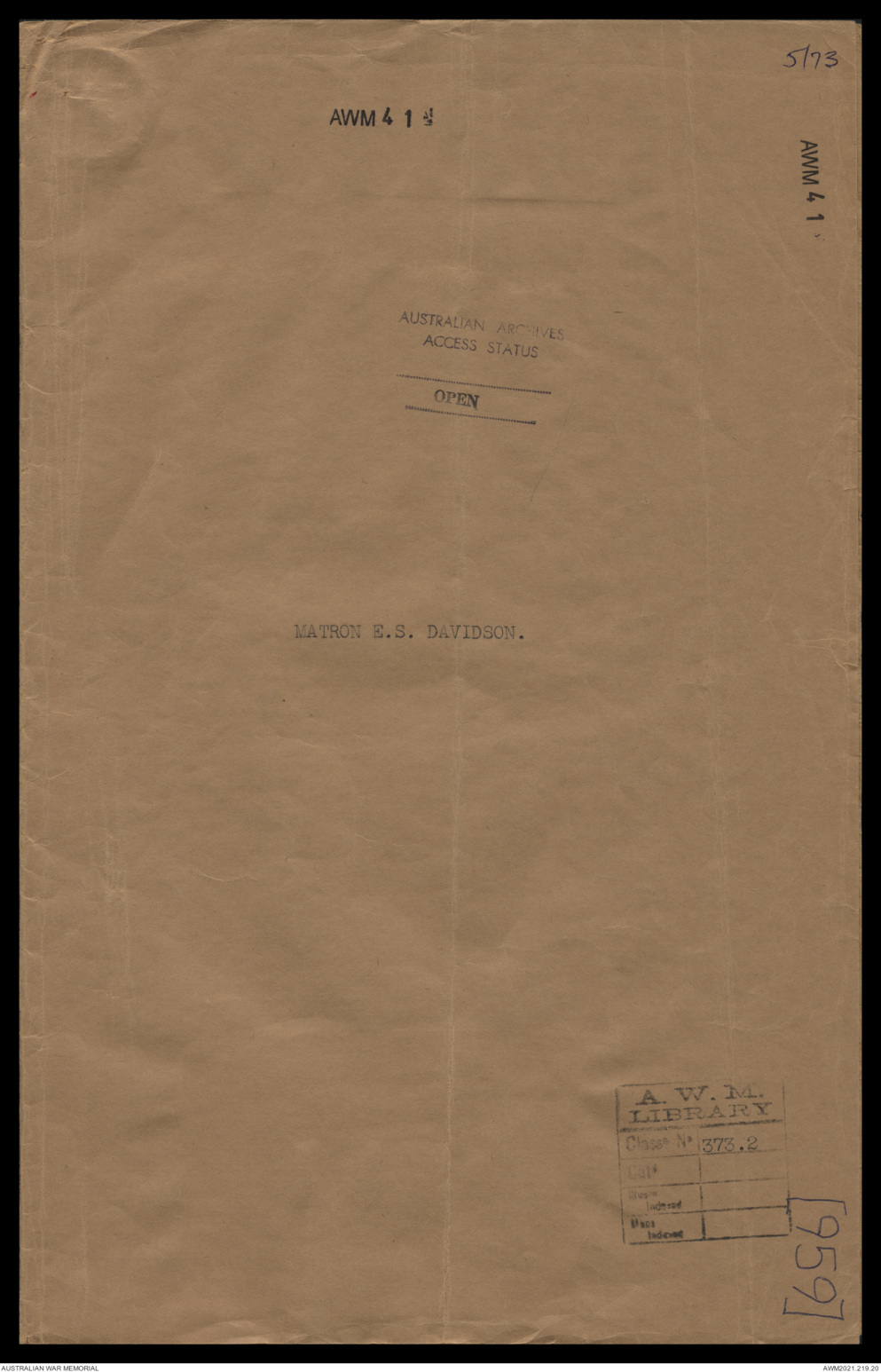
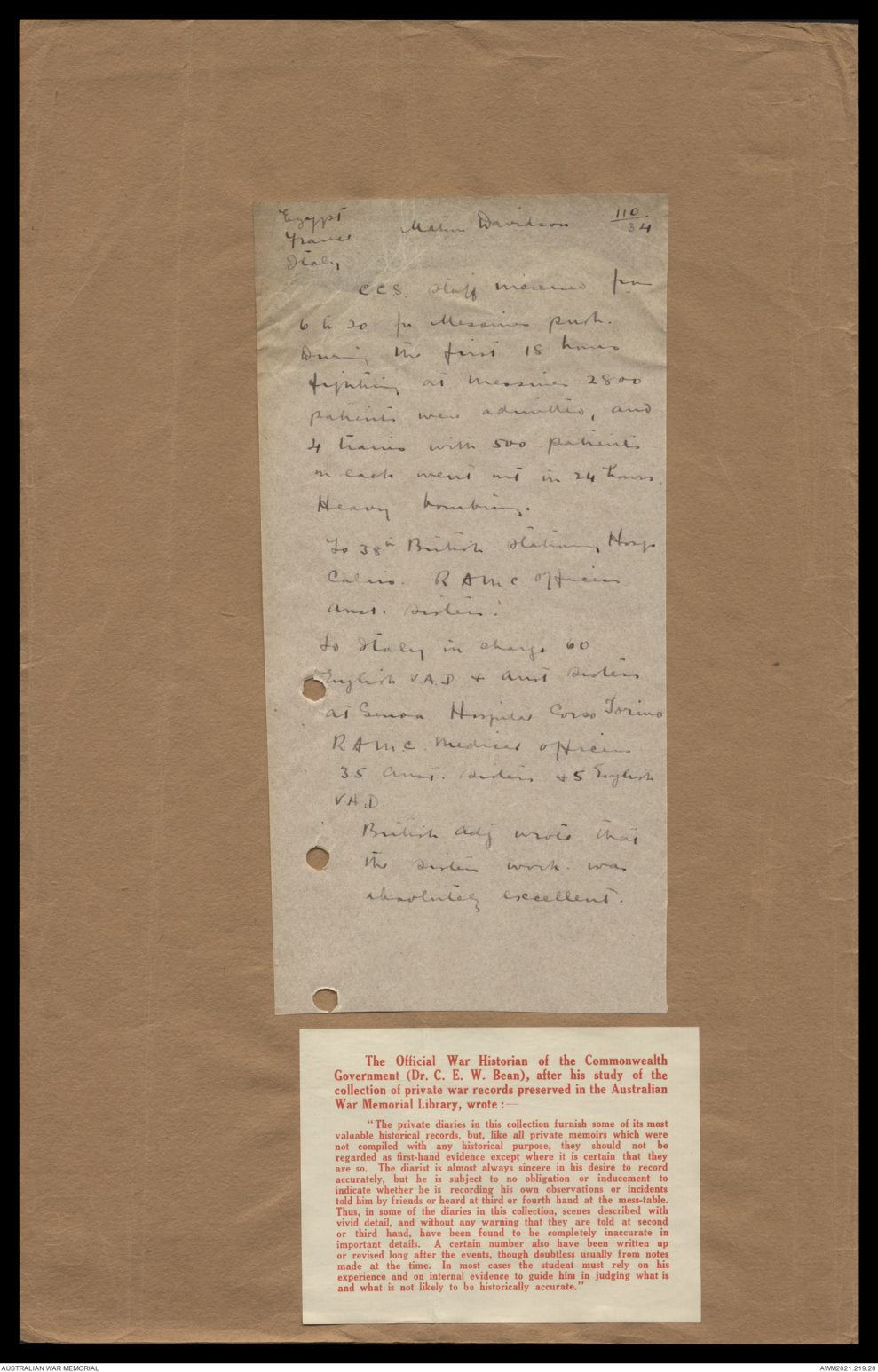
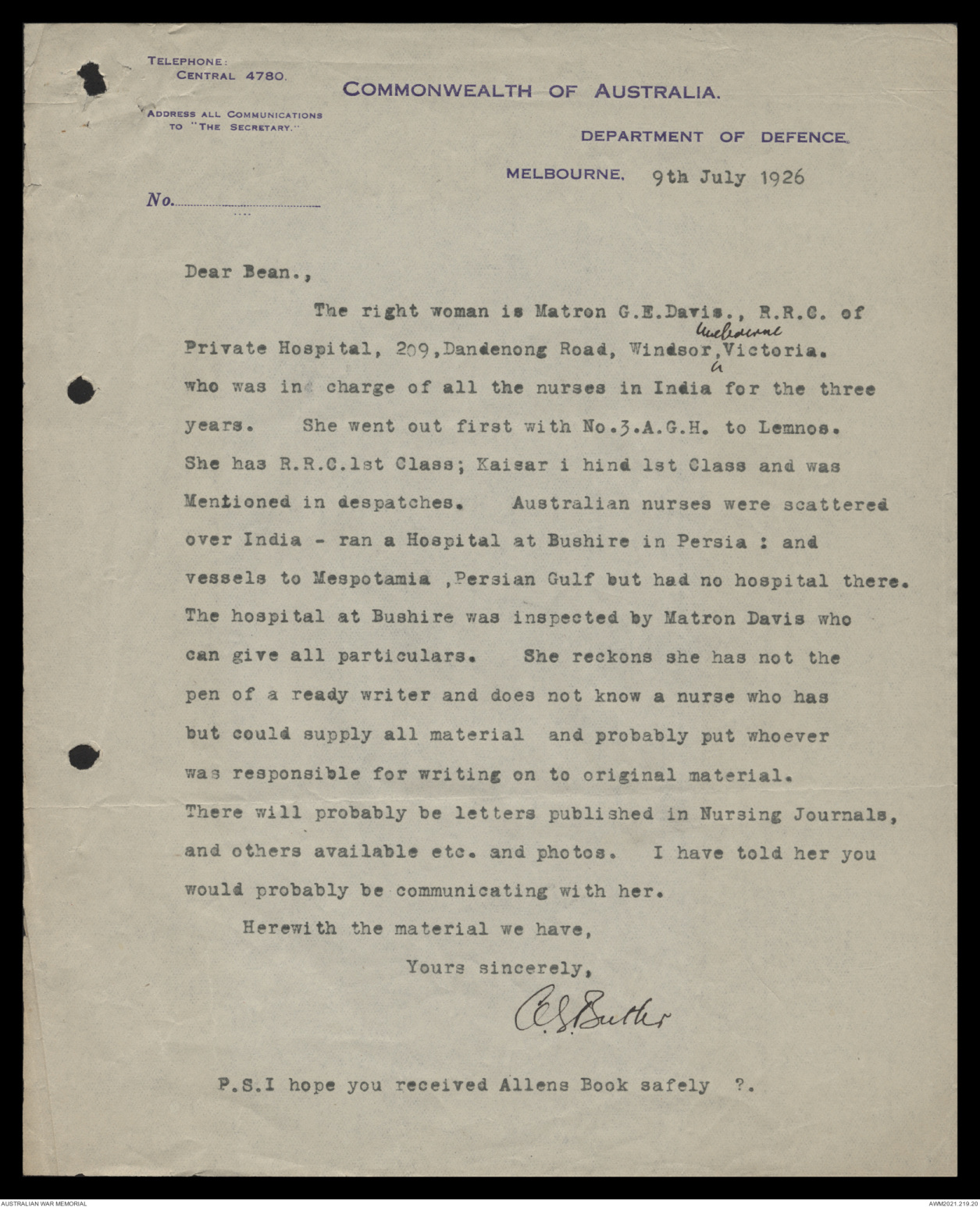
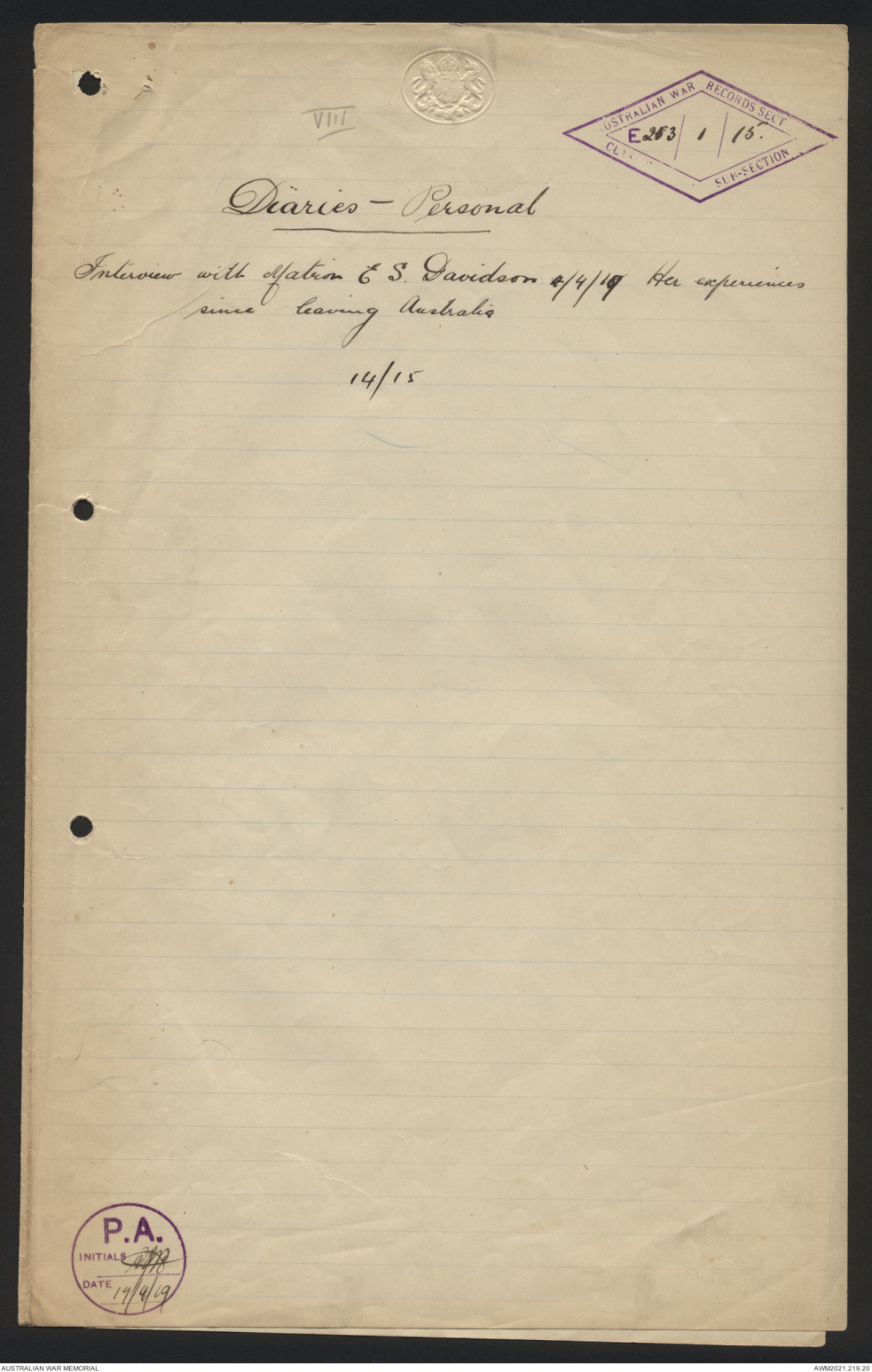
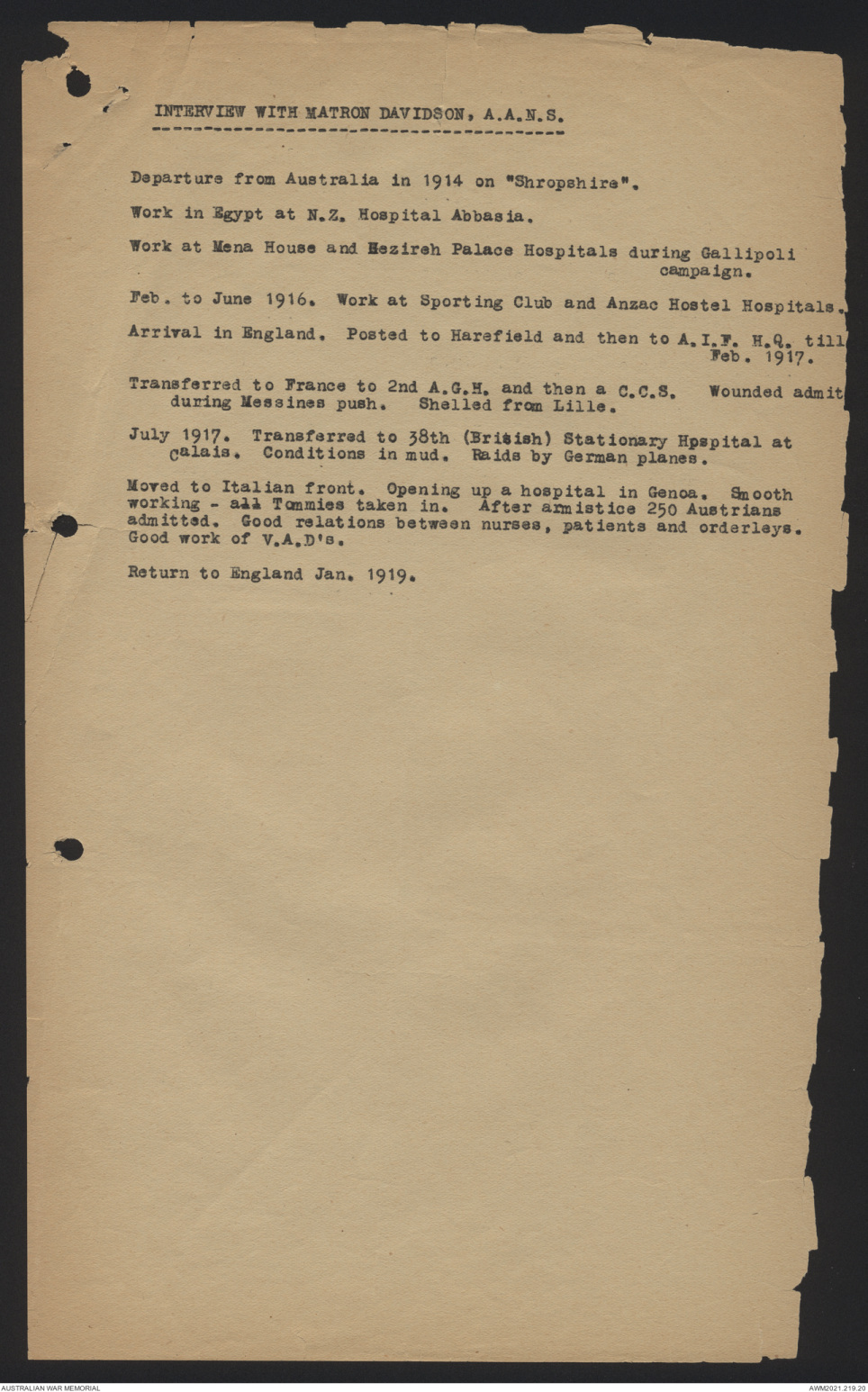
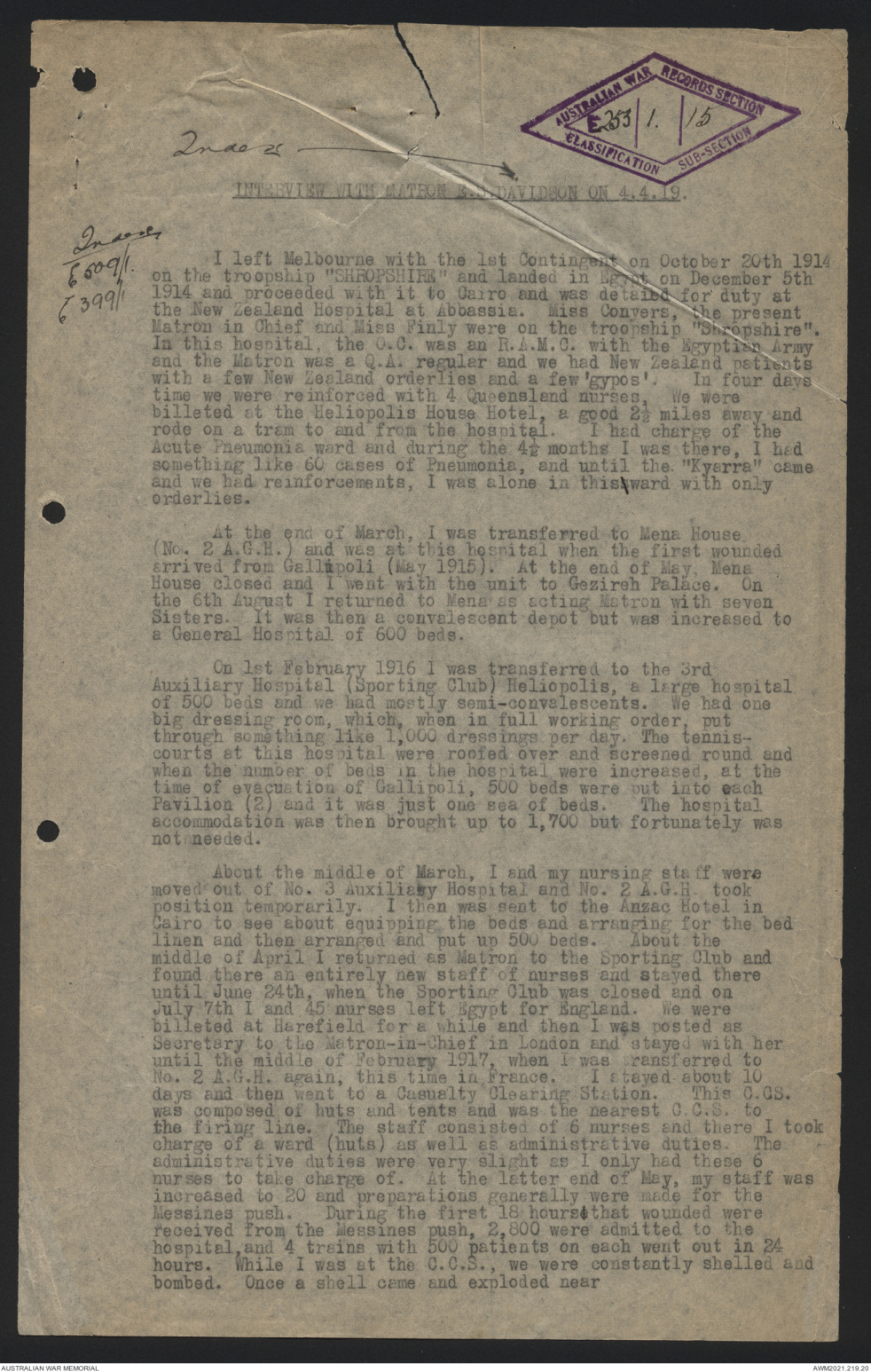
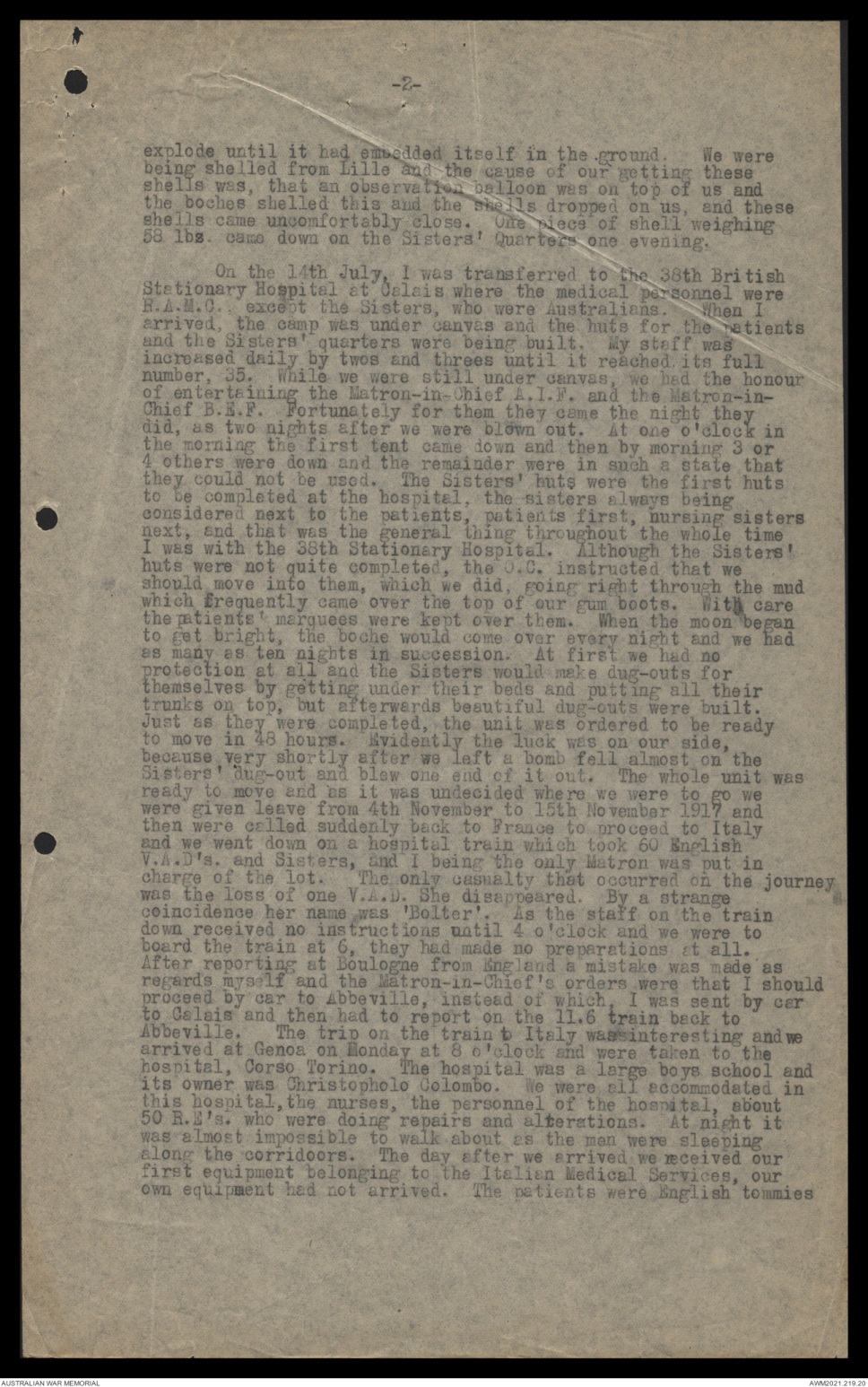
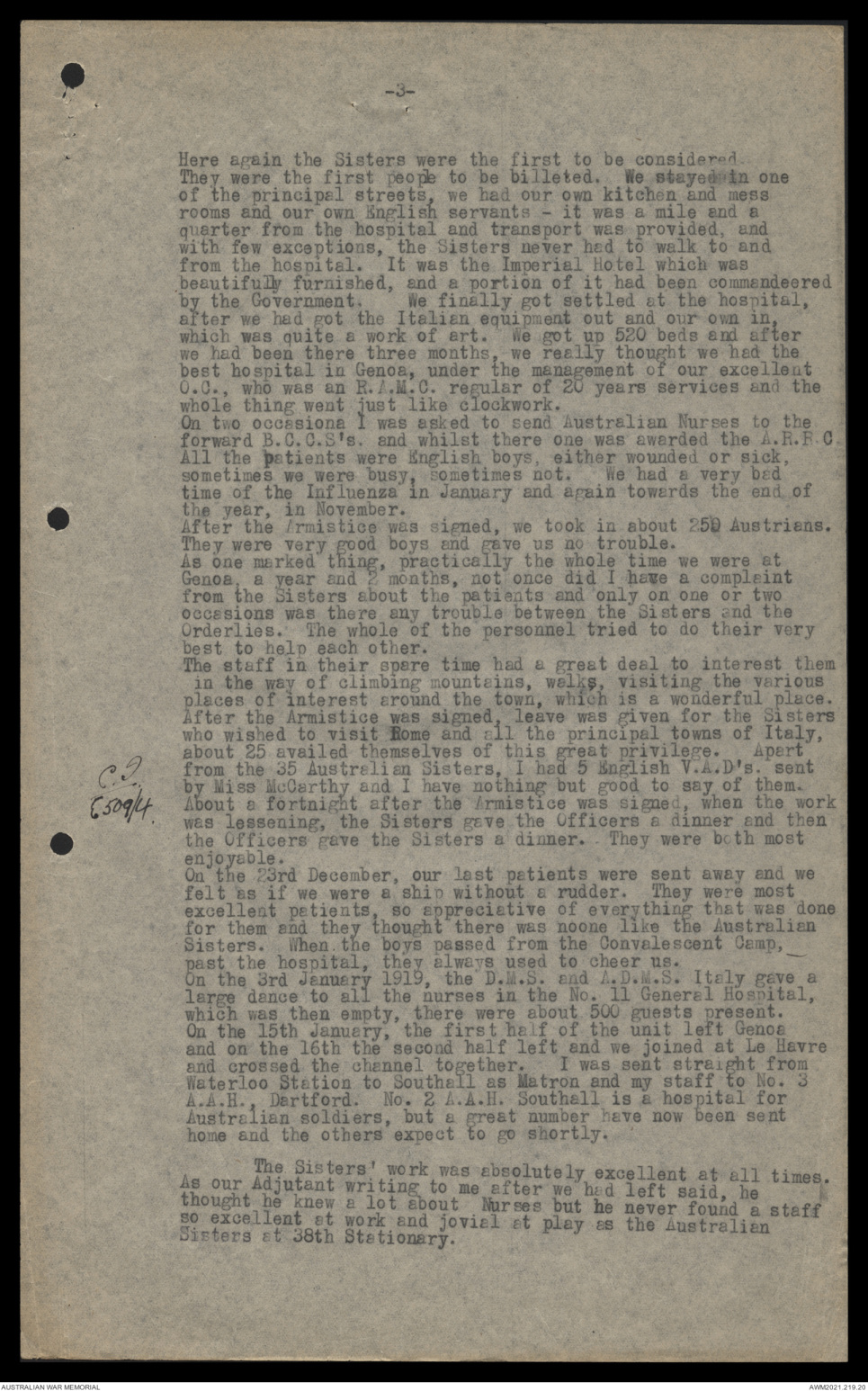
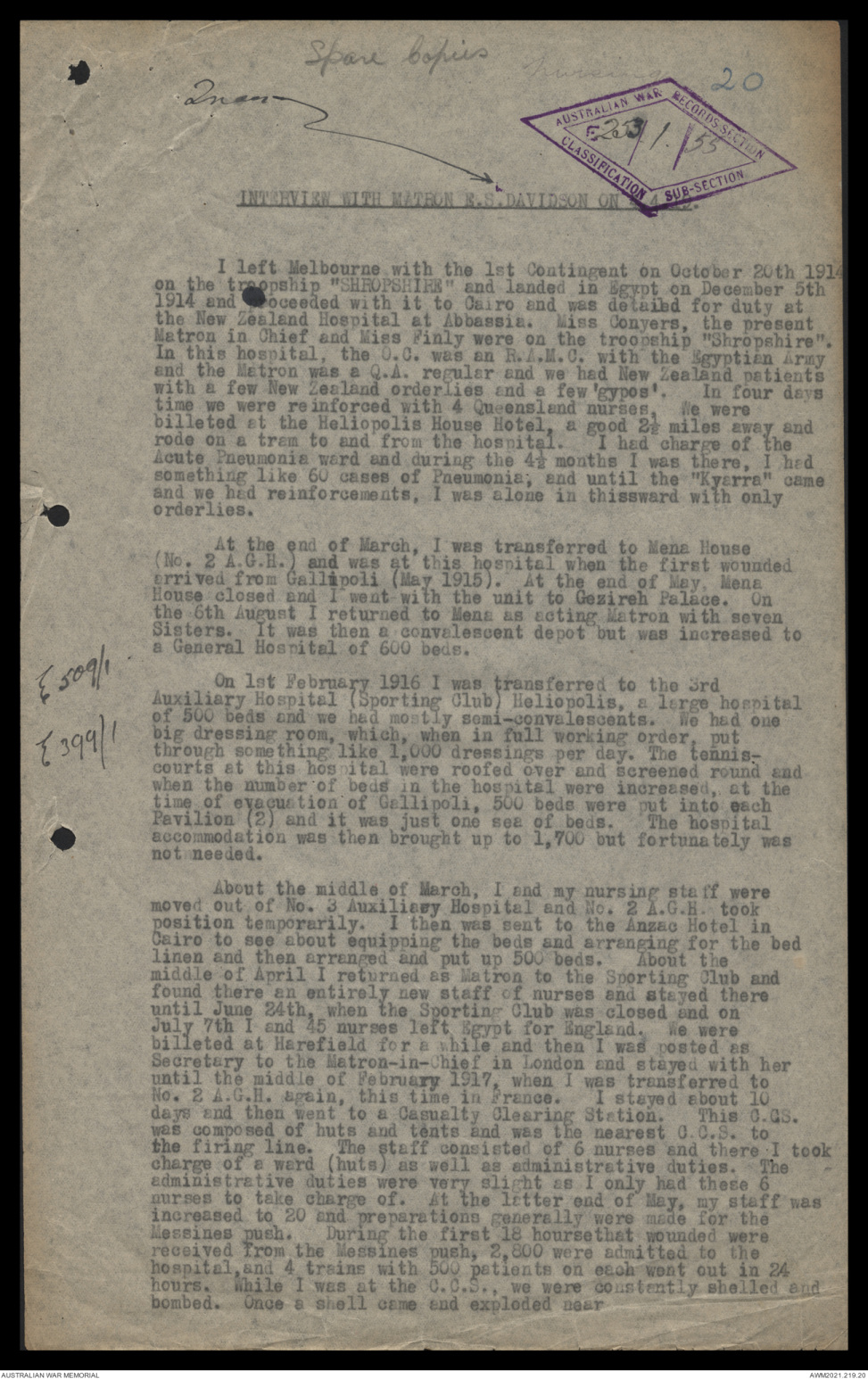
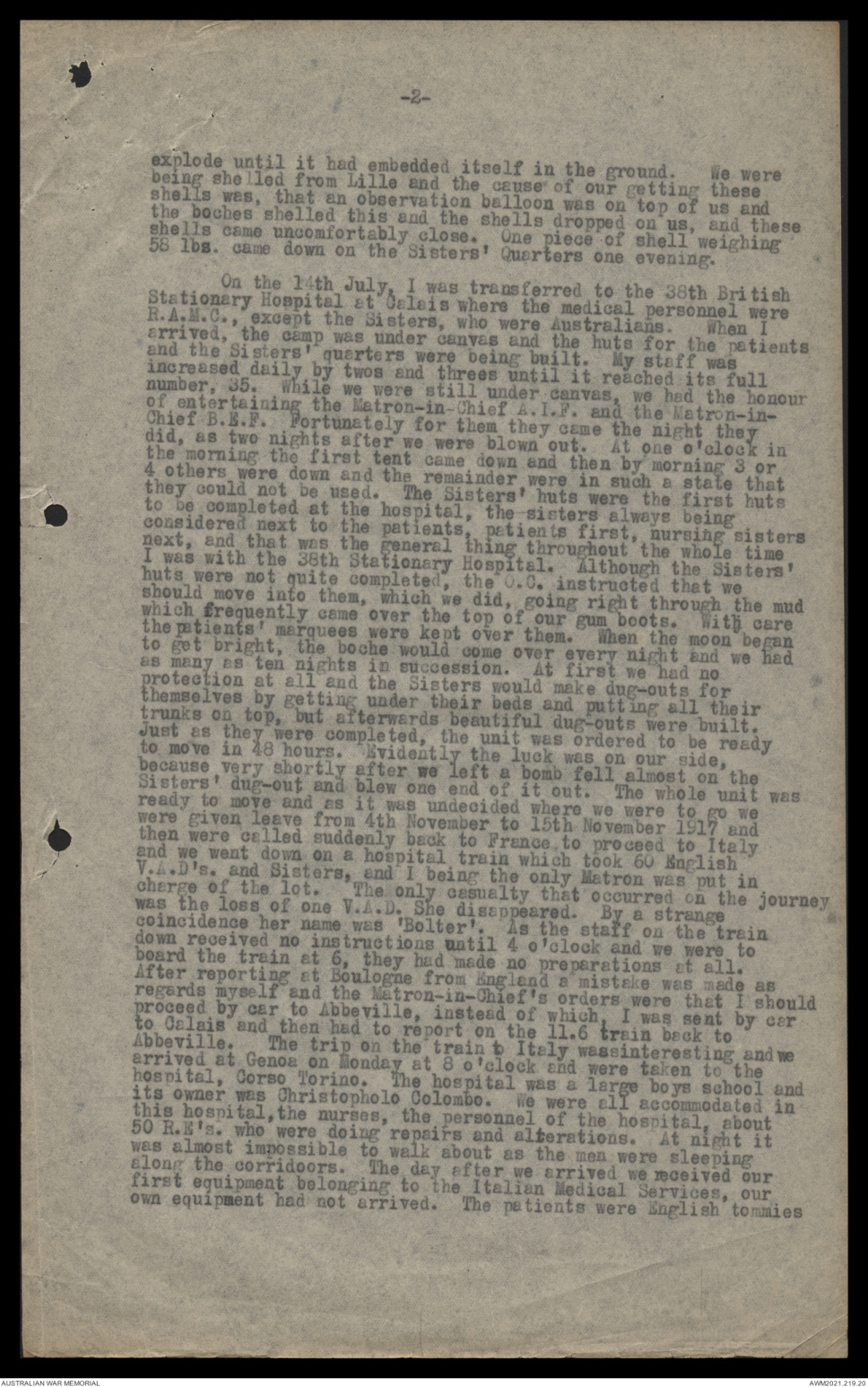
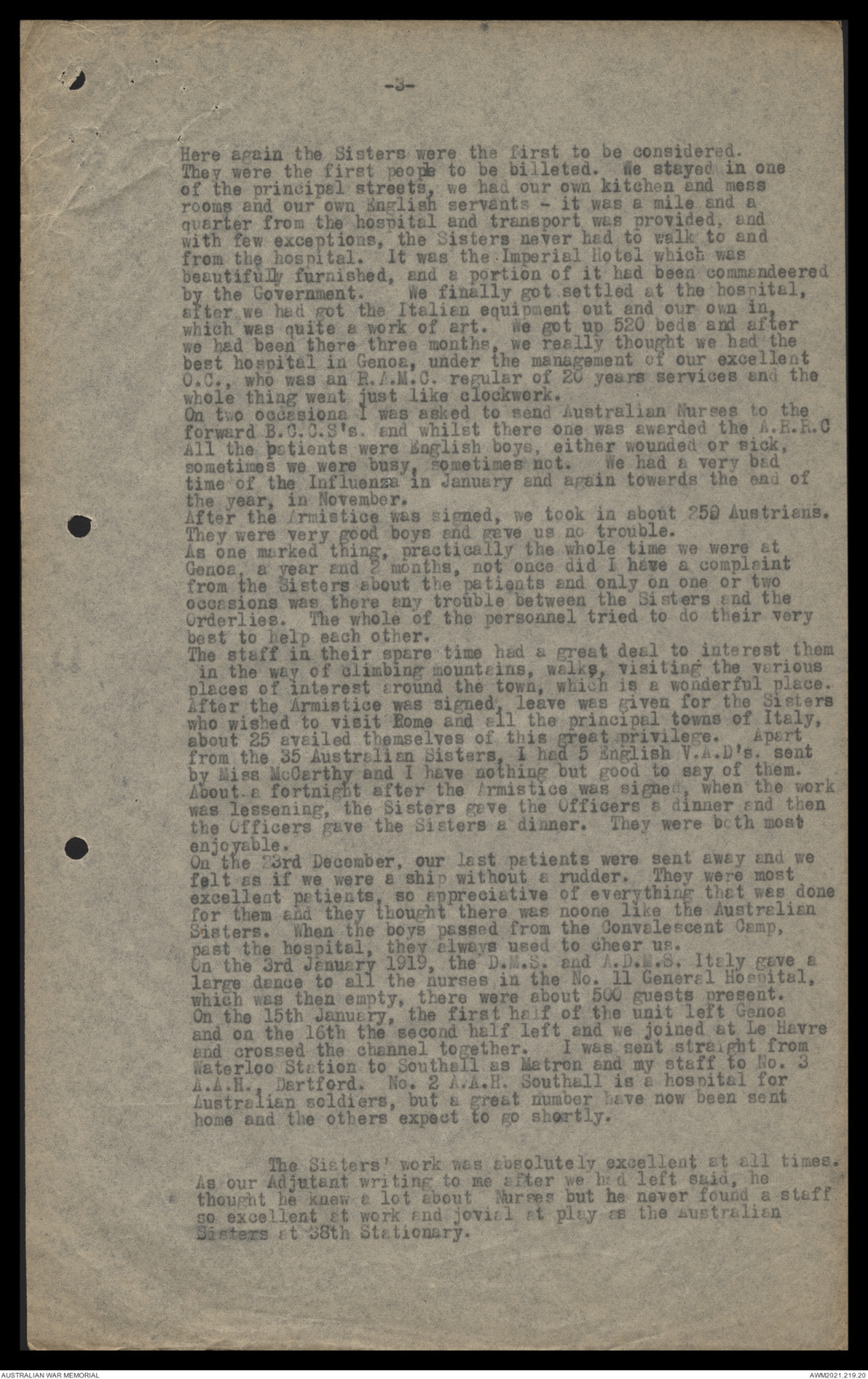
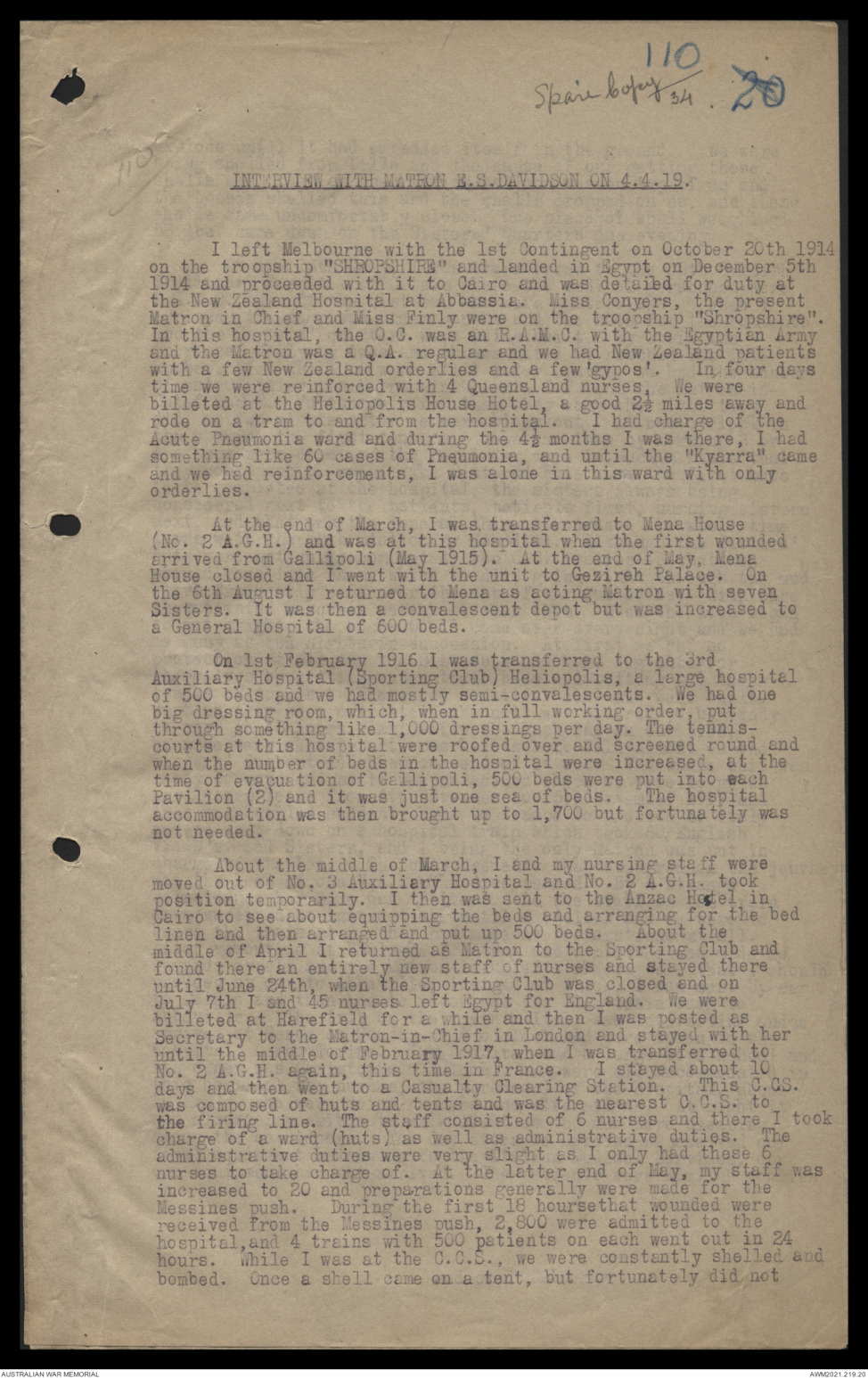
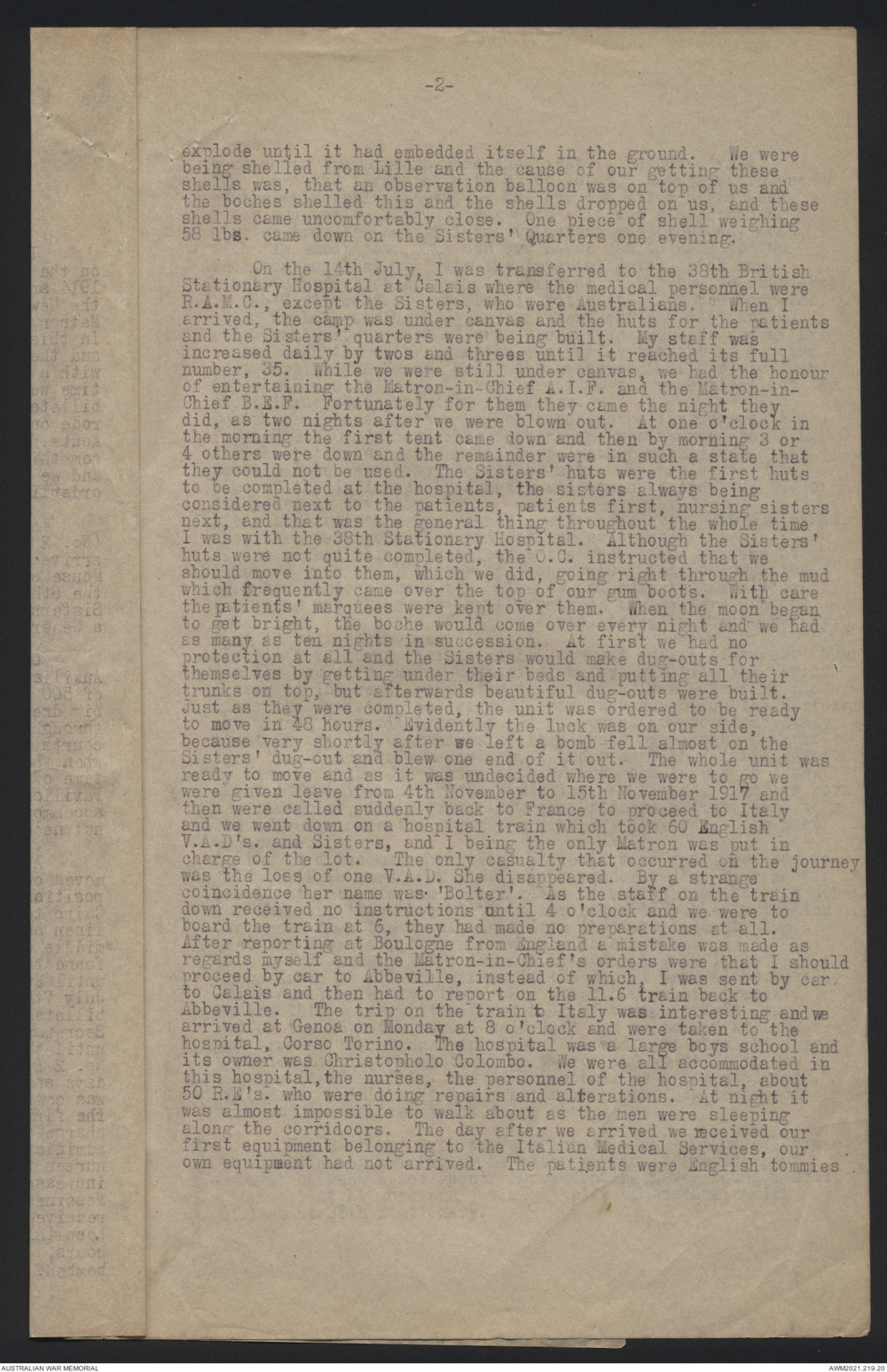
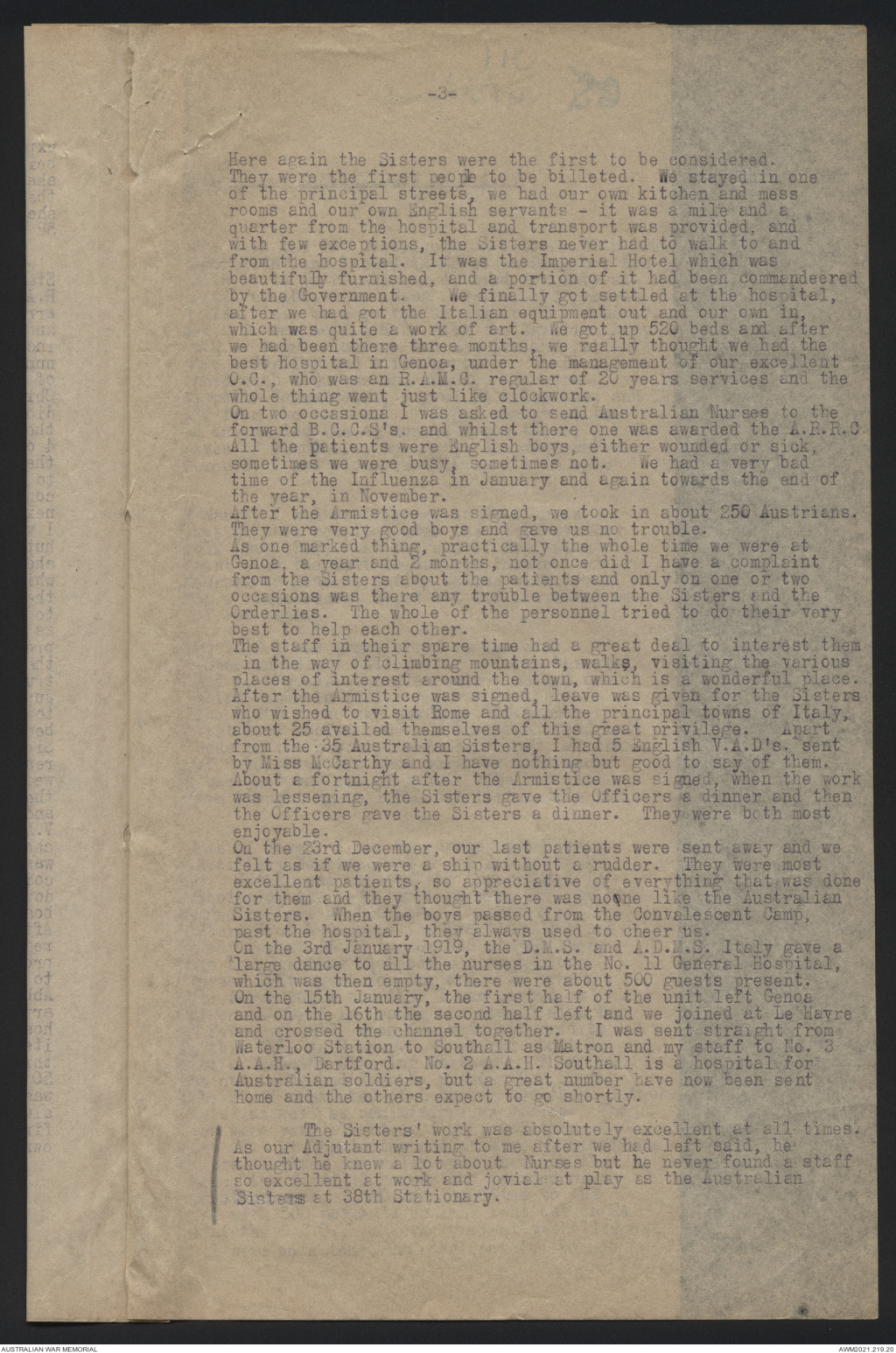
AWM 4 1 5/73
AUSTRALIAN ARCHIVES
ACCESS STATUS
OPEN
MATRON E.S. DAVIDSON.
A. W. M.
LIBRARY
Classn. No. 373.2
[959]
Egypt Matron Davidson 110/34
France
Italy
C.C.S. staff increased from
6 to 20 for Messines push.
During the first 18 hours
fighting at Messines 2800
patients were admitted, and
4 trains with 500 patients
in each went out in 24 hours.
Heavy bombing.
To 38th British Stationary Hosp
Calais. RAMC officers
Aust. sisters.
To Italy in charge 60
English V.A.D. & Aust sisters
at Genoa Hospital Corso Torino
RAMC Medical officers
35 Aust sisters & 5 English
V.A.D.
British adj wrote that
the sisters work was
absolutely excellent.
The Official War Historian of the Commonwealth
Government (Dr. C. E. W. Bean), after his study of the
collection of private war record preserved in the Australian
War Memorial Library, wrote:
"The private diaries in this collection furnish some of its most
valuable historical records, but, like all private memoirs which were
not compiled with any historical purpose, they should not be
regarded as first-hand evidence except where it is certain that they
are so. The diarist is almost always sincere in his desire to record
accurately, but he is subject to no obligation or inducement to
indicate whether he is recording his own observations or incidents
told him by friends or heard at third or fourth hand at the mess-table.
Thus, in some of the diaries in this collection, scenes described with
vivid detail, and without any warning that they are told at second
or third hand, have been found to be completely inaccurate in
important details. A certain number also have been written up
or revised long after the events, though doubtless usually from notes
made at the time. In most cases the student must rely on his
experience and on internal evidence to guide him in judging what is
and what is not likely to be historically accurate."
TELEPHONE:
CENTRAL 4780.
COMMONWEALTH OF AUSTRALIA.
ADDRESS ALL COMMUNICATIONS
TO "THE SECRETARY"
DEPARTMENT OF DEFENCE
MELBOURNE. 9th July 1926
No. ........................................
Dear Bean.,
The right woman is Matron G. E. Davis., R.R.C. of
Private Hospital, 209, Dandenong Road, Windsor, ^Melbourne, Victoria.
who was in charge of all the nurses in India for the three
years. She went out first with No. 3. A.G.H. to Lemnos.
She has R.R.C. 1st Class; Kaisar i hind 1st Class and was
Mentioned in despatches. Australian nurses were scattered
over India - ran a Hospital at Bushire in Persia: and
vessels to Mespotamia, Persian Gulf but had no hospital there.
The hospital at Bushire was inspected by Matron Davis who
can give all particulars. She reckons she has not the
pen of a ready writer and does not know a nurse who has
but could supply all material and probably put whoever
was responsible for writing on to original material.
There will probably be letters published in Nursing Journals,
and others available etc. and photos. I have told her you
would probably be communicating with her.
Herewith the material we have,
Yours sincerely,
A.S.Butler
P.S. I hope you received Allens Book safely?.
[*VIII*]
AUSTRALAIN WAR RECORDS SECT
E253/1/15.
Diaries-Personal
Interview with Matron E S. Davidson 4/4/19 Her experiences
since leaving Australia
14/15
[*P.A
INITIALS [[?]]
DATE 19/4/19*]
INTERVIEW WITH MATRON DAVIDSON, A.A.N.S.
Departure from Australia in 1914 on "Shropshire".
Work in Egypt at N.Z. Hospital Abbasia.
Work at Mena House and Hezireh Palace Hospitals during Gallipoli campaign.
Feb. to June 1916. Work at Sporting Club and Anzac Hostel Hospitals.
Arrival in England. Posted to Harefield and then to A.I.F. H.Q. till Feb. 1917.
Transferred to France to 2nd A.G.H. and then a C.C.S. Wounded admit
during Messines push. Shelled from Lille.
July 1917. Transferred to 38th (British) Stationary Hpspital at
Calais. Conditions in mud. Raids by German planes.
Moved to Italian front. Opening up a hospital in Genoa. Smooth
working - all Tommies taken in. After armistice 250 Austrians
admitted. Good relations between nurses, patients and orderleys.
Good work of V.A.D's.
Return to England Jan. 1919.
[*AUSTRALIAN WAR RECORDS SECTION
E253/1./15
Index
INTERVIEW WITH MATRON E. S. DAVIDSON ON 4.4.19.
[*Index
E 509/1.
E 399/1*]
I left Melbourne with the 1st Contingent on October 20th 1914
on the troopship "SHROPSHIRE" and landed in Egypt on December 5th
1914 and proceeded with it to Cairo and was detaied for duty at
the New Zealand Hospital at Abbassia. Miss Conyers, the present
Matron in Chief and Miss Finly were on the troopship "Shropshire".
In this Hospital, the O.C. was an R.A.M.C. with the Egyptian Army
and the Matron was a Q.A. regular and we had New Zealand patients
with a few New Zealand orderlies and a few 'gypos'. In four days
time we were reinforced with 4 Queensland nurses. We were
billeted at the Heliopolis House Hotel, a good 2 ½ miles away and
rode on a tram to and from the hospital. I had charge of the
Acute Pneumonia ward and during the 4 ½ months I was there, I had
something like 60 cases of Pneumonia, and until the "Kyarra" came
and we had reinforcements, I was alone in thiss ward with only
orderlies.
At the end of March, I was transferred to Mena House.
(No. 2 A.G.H.) and was at this hospital when the first wounded
arrived from Gallipoli (May 1915). At the end of May, Mena
House closed and I went with the unit to Gezireh Palace. On
the 6th August I returned to Mena as acting Matron with seven
Sisters. It was then a convalescent depot but was increased to
a General Hospital of 600 beds.
On 1st February 1916 I was transferred to the 3rd
Auxiliary Hospital (Sporting Club) Heliopolis, a large hospital
of 500 beds and we had mostly semi-convalescents. We had one
big dressing room, which, when in full working order, put
through something like 1,000 dressings per day. The tennis-
courts at this hospital were roofed over and screened round and
when the number of beds in the hospital were increased, at the
time of evacuation of Gallipoli, 500 beds were put into each
Pavilion (2) and it was just one sea of beds. The hospital
accommodation was then brought up to 1,700 but fortunately was
not needed.
About the middle of March, I and my nursing staff were
moved out of No. 3 Auxiliary Hospital and No. 2 A.G.H. took
position temporarily. I then was sent to the Anzac Hotel in
Cairo to see about equipping the beds and arranging for the bed
linen and then arranged and put up 500 beds. About the
middle of April I returned as Matron to the Sporting Club and
found there an entirely new staff of nurses and stayed there
until June 24th, when the Sporting Club was closed and on
July 7th I and 45 nurses left Egypt for England. We were
billeted at Harefield for a while and then I was posted as
Secretary to the Matron-in-Chief in London and stayed with her
until the middle of February 1917, when I was transferred to
No. 2 A.G.H. again, this time in France. I stayed about 10
days and then went to a Casualty Clearing Station. This C.CS.
was composed of huts and tents and was the nearest C.C.S. to
the firing line. The staff consisted of 6 nurses and there I took
charge of a ward (huts) as well as administrative duties. The
administrative duties were very slight as I only had these 6
nurses to take charge of. At the latter end of May, my staff was
increased to 20 and preparations generally were made for the
Messines push. During the first 18 hourse that wounded were
received from the Messines push, 2,800 were admitted to the
hospital, and 4 trains with 500 patients on each went out in 24
hours. While I was at the C.C.S., we were constantly shelled and
bombed. Once a shell came and exploded near
-2-
explode until it had embedded itself in the ground. We were
being shelled from Lille and the cause of our getting these
shells was, that an observation balloon was on top of us and
the boches shelled this and the shells dropped on us, and these
shells came uncomfortably close. One piece of shell weighing
58 lbs. came down on the Sisters' Quarters one evening.
On the 14th July, I was transferred to the 38th British
Stationary Hospital at Calais where the medical personnel were
R.A.M.C., except the Sisters, who were Australians. When I
arrived, the camp was under canvas and the huts for the patients
and the Sisters' quarters were being built. My staff was
increased daily by twos and threes until it reached its full
number, 35. While we were still under canvas, we had the honour
of entertaining the Matron-in-Chief A.I.F. and the Matron-in-
Chief B.E.F. Fortunately for them they came the night they
did, as two nights after we were blown out. At one o'clock in
the morning the first tent came down and then by morning 3 or
4 others were down and the remainder were in such a state that
they could not be used. The Sisters' huts were the first huts
to be completed at the hospital, the sisters always being
considered next to the patients, patients first, nursing sisters
next, and that was the general thing throughout the whole time
I was with the 38th Stationary Hospital. Although the Sisters'
huts were not quite completed, the O.C. instructed that we
should move into them, which we did, going right through the mud
which frequently came over the top of our gum boots. With care
the patients' marquees were kept over them. When the moon began
to get bright, the boche would come over every night and we had
as many as ten nights in succession. At first we had no
protection at all and the Sisters would make dug-outs for
themselves by getting under their beds and putting all their
trunks on top, but afterwards beautiful dug-outs were built.
Just as they were completed, the unit was ordered to be ready
to move in 48 hours. Evidently the luck was on our side,
because very shortly after we left a bomb fell almost on the
Sisters' dug-out and blew one end of it out. The whole unit was
ready to move and as it was undecided where we were to go we
were given leave from 4th November to 15th November 1917 and
then were called suddenly back to France to proceed to Italy
and we went down on a hospital train which took 60 English
V.A.D's and Sisters, and I being the only Matron was put in
charge of the lot. The only causalty that occurred on the journey
was the loss of one V.A.D. She disappeared. By a strange
coincidence her name was 'Bolter'. As the staff on the train
down received no instructions until 4 o'clock and we were to
board the train at 6, they had made no preparations at all.
After reporting at Boulogne from England a mistake was made as
regards myself and the Matron-in-Chief's orders were that I should
proceed by car to Abbeville, instead of which, I was sent by car
to Calais and then had to report on the 11.6 train back to
Abbeville. The trip on the train to Italy was interesting and we
arrived at Genoa on Monday at 8 o'clock and were taken to the
hospital, Corso Torino. The hospital was a large boys school and
its owner was Christopholo Colombo. We were all accommodated in
this hospital, the nurses, the personnel of the hospital, about
50 R.E's. who were doing repairs and alterations. At night it
was almost impossible to walk about as the men were sleeping
along the corridoors. The day after we arrived we received our
first equipment belonging to the Italian Medical Services, our
own equipment had not arrived. The patients were English tommies
-3-
Here again the Sisters were the first to be considered.
They were the first people to be billeted. We stayed in one
of the principal streets, we had our own kitchen and mess
rooms and our own English servants - it was a mile and a
quarter from the hospital and transport was provided, and
with few exceptions, the Sisters never had to walk to and
from the hospital. It was the Imperial Hotel which was
beautifully furnished, and a portion of it had been commandeered
by the Government. We finally got settled at the hospital,
after we had got the Italian equipment out and our own in,
which was quite a work of art. We got up 520 beds and after
we had been there three months, we really thought we had the
best hospital in Genoa, under the management of our excellent
O.C., who was an R.A.M.C. regular of 20 years services and the
whole thing went just like clockwork.
On two occasions I was asked to send Australian Nurses to the
forward B.C.C.S's. and whilst there one was awarded the A.R.R.C.
All the patients were English boys, either wounded or sick,
sometimes we were busy, sometimes not. We had a very bad
time of the Influenza in January and again towards the end of
the year, in November.
After the Armistice was signed, we took in about 250 Austrians.
They were very good boys and gave us no trouble.
As one marked thing, practically the whole time we were at
Genoa, a year and 2 months, not once did I have a complaint
from the Sisters about the patients and only on one or two
occasions was there any trouble between the Sisters and the
Orderlies. The whole of the personnel tried to do their very
best to help each other.
The staff in their spare time had a great deal to interest them
in the way of climbing mountains, walks, visiting the various
places of interest around the town, which is a wonderful place.
After the Armistice was signed, leave was given for the Sisters
who wished to visit Rome and all the principal towns of Italy,
about 25 availed themselves of this great privilege. Apart
from the 35 Australian Sisters, I had 5 English V.A.D's. sent
by Miss McCarthy and I have nothing but good to say of them.
[* C.I
E 509/4.*]
About a fortnight after the Armistice was signed, when the work
was lessening, the Sisters gave the Officers a dinner and then
the Officers gave the Sisters a dinner. They were both most
enjoyable.
On the 23rd December, our last patients were sent away and we
felt as if we were a ship without a rudder. They were most
excellent patients, so appreciative of everything that was done
for them and they thought there was noone like the Australian
Sisters. When the boys passed from the Convalescent Camp,
past the hospital, they always used to cheer us.
On the 3rd January 1919, the D.M.S. and A.D.M.S. Italy gave a
large dance to all the nurses in the No. 11 General Hospital,
which was then empty, there were about 500 guests present.
On the 15th January, the first half of the unit left Genoa
and on the 16th the second half left and we joined at Le Havre
and crossed the channel together. I was sent straight from
Waterloo Station to Southall as Matron and my staff to No. 3
A.A.H., Dartford. No. 2 A.A.H. Southall is a hospital for
Australian soldiers, but a great number have now been sent
home and the others expect to go shortly.
The Sisters' work was absolutely excellent at all times.
As our Adjutant writing to me after we had left said, he
thought he knew a lot about Nurses but he never found a staff
so excellent at work and jovial at play as the Australian
Sisters at 38th Stationary.
Spare Copies Nursing 20
[*AUSTRALIAN WAR RECORDS SECTION
E253/1./55
Index*]
INTERVIEW WITH MATRON E. S. DAVIDSON ON 4.4.19.
I left Melbourne with the 1st Contingent on October 20th 1914
on the troopship "SHROPSHIRE" and landed in Egypt on December 5th
1914 and proceeded with it to Cairo and was detailed for duty at
the New Zealand Hospital at Abbassia. Miss Conyers, the present
Matron in Chief and Miss Finly were on the troopship "Shropshire".
In the Hospital, the O.C. was an R.A.M.C. with the Egyptian Army
and the Matron was a Q.A. regular and we had New Zealand patients
with a few New Zealand orderlies and a few 'gypos'. In four days
time we were reinforced with 4 Queensland nurses, We were
billeted at the Heliopolis House Hotel, a good 2 ½ miles away and
rode on a tram to and from the hospital. I had charge of the
Acute Pneumonia ward and during the 4 ½ months I was there, I had
something like 60 cases of Pneumonia, and until the "Kyarra" came
and we had reinforcements, I was alone in thiss ward with only
orderlies.
At the end of March, I was transferred to Mena House.
(No. 2 A.G.H) and was at this hospital when the first wounded
arrived from Gallipoli (May 1915). At the end of May, Mena
House closed and I went with the unit to Gezireh Palace. On
the 6th August I returned to Mena as acting Matron with seven
Sisters. It was then a convalescent depot but was increased to
a General Hospital of 600 beds.
On 1st February 1916 I was transferred to the 3rd
Auxiliary Hospital (Sporting Club) Heliopolis, a large hospital
of 500 beds and we had mostly semi-convalescents. We had one
big dressing room, which, when in full working order, put
through something like 1,000 dressings per day. The tennis-
courts at this hospital were roofed over and screened round and
when the number of beds in the hospital were increased, at the
time of evacuation of Gallipoli, 500 beds were put into each
Pavilion (2) and it was just one sea of beds. The hospital
accomodation was then brought up to 1,700 but fortunately was
not needed.
About the middle of March, I and my nursing staff were
moved out of No. 3 Auxiliary Hospital and No. 2 A.G.H. took
position temporarily. I then was sent to the Anzac Hotel in
Cairo to see about equipping the beds and arranging for the bed
linen and then arranged and put up 500 beds. About the
middle of April I returned as Matron to the Sporting Club and
found there an entirely new staff of nurses and stayed there
until June 24th, when the Sporting Club was closed and on
July 7th I and 45 nurses left Egypt for England. We were
billeted at Harefield for a while and then I was posted as
Secretary to the Matron-in-Chief in London and stayed with her
until the middle of February 1917, when I was transferred to
No. 2 A.G.H. again, this time in France. I stayed about 10
days and then went to a Casualty Clearing Station. This C.CS.
was composed of huts and tents and was the nearest C.C.S. to
the firing line. The staff consisted of 6 nurses and there I took
charge of a ward (huts) as well as administrative duties. The
administrative duties were very slight as I only had these 6
nurses to take charge of. At the latter end of May, my staff was
increased to 20 and preparations generally were made for the
Messines push. During the first 18 hourse that wounded were
received from the Messines push, 2,800 were admitted to the
hospital, and 4 trains with 500 patients on each went out in 24
hours. While I was at the C.C.S., we were constantly shelled and
bombed. Once a shell came and exploded near
-2-
explode until it had embedded itself in the ground. We were
being shelled from Lille and the cause of our getting these
shells was, that an observation balloon was on top of us and
the boches shelled this and the shells dropped on us, and these
shells came uncomfortably close. One piece of shell weighing
58 lbs. came down on the Sisters' Quarters one evening.
On the 14th July, I was transferred to the 38th British
Stationary Hospital at Calais where the medical personnel were
R.A.M.C., except the Sisters, who were Australians. When I
arrived, the camp was under canvas and the huts for the patients
and the Sisters' quarters were being built. My staff was
increased daily by twos and threes until it reached its full
number, 35. While we were still under canvas, we had the honour
of entertaining the Matron-in-Chief A.I.F. and the Matron-in-
Chief B.E.F. Fortunately for them they came the night they
did, as two nights after we were blown out. At one o'clock in
the morning the first tent came down and then by morning 3 or
4 others were down and the remainder were in such a state that
they could not be used. The Sisters' huts were the first huts
to be completed at the hospital, the sisters always being
considered next to the patients, patients first, nursing sisters
next, and that was the general thing throughout the whole time
I was with the 38th Stationary Hospital. Although the Sisters'
huts were not quite completed, the O.C. instructed that we
should move into them, which we did, going right through the mud
which frequently came over the top of our gum boots. With care
the patients' marquees were kept over them. When the moon began
to get bright, the boche would come over every night and we had
as many as ten nights in succession. At first we had no
protection at all and the Sisters would make dug-outs for
themselves by getting under their beds and putting all their
trunks on top, but afterwards beautiful dug-outs were built.
Just as they were completed, the unit was ordered to be ready
to move in 48 hours. Evidently the luck was on our side,
because very shortly after we left a bomb fell almost on the
Sisters' dug-out and blew one end of it out. The whole unit was
ready to move and as it was undecided where we were to go we
were given leave from 4th November to 15th November 1917 and
then were called suddenly back to France to proceed to Italy
and we went down on a hospital train which took 60 English
V.A.D's and Sisters, and I being the only Matron was put in
charge of the lot. The only causality that occurred on the journey
was the loss of one V.A.D. She disappeared. By a strange
coincidence her name was 'Bolter'. As the staff on the train
down received no instructions until 4 o'clock and we were to
board the train at 6, they had made no preparations at all.
After reporting at Boulogne from England a mistake was made as
regards myself and the Matron-in-Chief's orders were that I should
proceed by car to Abbeville, instead of which, I was sent by car
to Calais and then had to report on the 11.6 train back to
Abbeville. The trip on the train to Italy wass interesting and we
arrived at Genoa on Monday at 8 o'clock and were taken to the
hospital, Corso Torino. The hospital was a large boys school and
its owner was Christopholo Colombo. We were all accommodated in
this hospital, the nurses, the personnel of the hospital, about
50 R.E's. who were doing repairs and alterations. At night it
was almost impossible to walk about as the men were sleeping
along the corridoors. The day after we arrived we received our
first equipment belonging to the Italian Medical Services, our
own equipment had not arrived. The patients were English tommies
-3-
Here again the Sisters were the first to be considered.
They were the first people to be billeted. We stayed in one
of the principal streets, we had our own kitchen and mess
rooms and our own English servants-it was a mile and a
quarter from the hospital and transport was provided, and
with few exceptions, the Sisters never had to walk to and
from the hospital. It was the Imperial Hotel which was
beautifully furnished, and a portion of it had been commandeered
by the Government. We finally got settled at the hospital
after we had got the Italian equipment out and our own in,
which was quite a work of art. We got up 520 beds and after
we had been there three months, we really thought we had the
best hospital in Genoa, under the management of our excellent
O.C., who was an R.A.M.C. regular of 20 years services and the
whole thing went just like clockwork.
On two occasions I was asked to send Australian Nurses to the
forward B.C.C.S's. and whilst there one was awarded the A.R.R.C.
All the patients were English boys, either wounded or sick,
sometimes we were busy, sometimes not. We had a very bad
time of the Influenza in January and again towards the end of
the year, in November.
After the Armistice was signed, we took in about 250 Austrians.
They were very good boys and gave us no trouble.
As one marked thing, practically the whole time we were at
Genoa, a year and 2 months, not once did I have a complaint
from the Sisters about the patients and only on one or two
occasions was there any trouble between the Sisters and the
Orderlies. The whole of the personnel tried to do their very
best to help each other.
The staff in their spare time had a great deal to interest them
in the way of climbing mountains, walks, visiting the various
places of interest around the town, which is a wonderful place.
After the Armistice was signed, leave was given for the Sisters
who wished to visit Rome and all the principal towns of Italy,
about 25 availed themselves of this great privilege. Apart
from the 35 Australian Sisters, I had 5 English V.A.D's. sent
by Miss McCarthy and I have nothing but good to say of them.
About a fortnight after the Armistice was signed, when the work
was lessening, the Sisters gave the Officers a dinner and then
the Officers gave the Sisters a dinner. They were both most
enjoyable.
On the 23rd December, our last patients were sent away and we
felt as if we were a ship without a rudder. They were most
excellent patients, so appreciative of everything that was done
for them and they thought there was noone like the Australian
Sisters. When the boys passed from the Convalescent Camp,
past the hospital, they always used to cheer us.
On the 3rd January 1919, the D.M.S. and A.D.M.S. Italy gave a
large dance to all the nurses in the No. 11 General Hospital,
which was then empty, there were about 500 guests present.
On the 15th January, the first half of the unit left Genoa
and on the 16th the second half left and we joined at Le Havre
and crossed the channel together. I was sent straight from
Waterloo Station to Southall as Matron and my staff to No. 3
A.A.H., Dartford. No. 2 A.A.H. Southall is a hospital for
Australian soldiers, but a great number have now been sent
home and the others expect to go shortly.
The Sisters' work was absolutely excellent at all times.
As our Adjutant writing to me after we had left said, he
thought he knew a lot about Nurses but he never found a staff
so excellent at work and jovial at play as the Australian
Sisters at 38th Stationary.
[*110
Spare Copy/34 20 *]
[*1100*]
INTERVIEW WITH MATRON E. S. DAVIDSON ON 4.4.19.
I left Melbourne with the 1st Contingent on October 20th 1914
on the troopship "SHROPSHIRE" and landed in Egypt on December 5th
1914 and proceeded with it to Cairo and was detailed for duty at
the New Zealand Hospital at Abbassia. Miss Conyers, the present
Matron in Chief and Miss Finly were on the troopship "Shropshire".
In this Hospital, the O.C. was an R.A.M.C. with the Egyptian Army
and the Matron was a Q.A. regular and we had New Zealand patients
with a few New Zealand orderlies and a few 'gypos'. In four days
time we were reinforced with 4 Queensland nurses, We were
billeted at the Heliopolis House Hotel, a good 2 ½ miles away and
rode on a tram to and from the hospital. I had charge of the
Acute Pneumonia ward and during the 4 ½ months I was there, I had
something like 60 cases of Pneumonia, and until the "Kyarra" came
and we had reinforcements, I was alone in this ward with only
orderlies.
At the end of March, I was transferred to Mena House.
(No. 2 A.G.H) and was at this hospital when the first wounded
arrived from Gallipoli (May 1915). At the end of May, Mena
House closed and I went with the unit to Gezireh Palace. On
the 6th August I returned to Mena as acting Matron with seven
Sisters. It was then a convalescent depot but was increased to
a General Hospital of 600 beds.
On 1st February 1916 I was transferred to the 3rd
Auxiliary Hospital (Sporting Club) Heliopolis, a large hospital
of 500 beds and we had mostly semi-convalescents. We had one
big dressing room, which, when in full working order, put
through something like 1,000 dressings per day. The tennis-
courts at this hospital were roofed over and screened round and
when the number of beds in the hospital were increased, at the
time of evacuation of Gallipoli, 500 beds were put into each
Pavilion (2) and it was just one sea of beds. The hospital
accommodation was then brought up to 1,700 but fortunately was
not needed.
About the middle of March, I and my nursing staff were
moved out of No. 3 Auxiliary Hospital and No. 2 A.G.H. took
position temporarily. I then was sent to the Anzac Hotel in
Cairo to see about equipping the beds and arranging for the bed
linen and then arranged and put up 500 beds. About the
middle of April I returned as Matron to the Sporting Club and
found there an entirely new staff of nurses and stayed there
until June 24th, when the Sporting Club was closed and on
July 7th I and 45 nurses left Egypt for England. We were
billeted at Harefield for a while and then I was posted as
Secretary to the Matron-in-Chief in London and stayed with her
until the middle of February 1917, when I was transferred to
No. 2 A.G.H. again, this time in France. I stayed about 10
days and then went to a Casualty Clearing Station. This C.CS.
was composed of huts and tents and was the nearest C.C.S. to
the firing line. The staff consisted of 6 nurses and there I took
charge of a ward (huts) as well as administration duties. The
administrative duties were very slight as I only had these 6
nurses to take charge of. At the latter end of May, my staff was
increased to 20 and preparations generally were made for the
Messines push. During the first 18 hours that wounded were
received from the Messines push, 2,800 were admitted to the
hospital, and 4 trains with 500 patients on each went out in 24
hours. While I was at the C.C.S., we were constantly shelled and
bombed. Once a shell came on a tent, but fortunately did not
-2-
explode until it had embedded itself in the ground. We were
being shelled from Lille and the cause of our getting these
shells was, that an observation balloon was on top of us and
the boches shelled this and the shells dropped on us, and these
shells came uncomfortably close. One piece of shell weighing
58 lbs. came down on the Sisters' Quarters one evening.
On the 14th July, I was transferred to the 38th British
Stationary Hospital at Calais where the medical personnel were
R.A.M.C., except the Sisters, who were Australians. When I
arrived, the camp was under canvas and the huts for the patients
and the Sisters' quarters were being built. My staff was
increased daily by twos and threes until it reached its full
number, 35. While we were still under canvas, we had the honour
of entertaining the Matron-in-Chief A.I.F. and the Matron-in-
Chief B.E.F. Fortunately for them they came the night they
did, as two nights after we were blown out. At one o'clock in
the morning the first tent came down and then by morning 3 or
4 others were down and the remainder were in such as state that
they could not be used. The Sisters' huts were the first huts
to be completed at the hospital, the sisters always being
considered next to the patients, patients first, nursing sisters
next, and that was the general thing throughout the whole time
I was with the 38th Stationary Hospital. Although the Sisters'
huts were not quite completed, the O.C. instructed that we
should move into them, which we did, going right through the mud
which frequently came over the top of our gum boots. With care
the patients' marquees were kept over them. When the moon began
to get bright, the boche would come over every night and we had
as many as ten nights in succession. At first we had no
protection at all and the Sisters would make dug-outs for
themselves by getting under their beds and putting all their
trunks on top, but afterwards beautiful dug-outs were built.
Just as they were completed, the unit was ordered to be ready
to move in 48 hours. Evidently the luck was on our side,
because very shortly after we left a bomb fell almost on the
Sisters' dug-out and blew one end of it out. The whole unit was
ready to move and as it was undecided where we were to go we
were given leave from 4th November to 15th November 1917 and
then were called suddenly back to France to proceed to Italy
and we went down on a hospital train which took 60 English
V.A.D's and Sisters, and I being the only Matron was put in
charge of the lot. The only causality that occurred on the journey
was the loss of one V.A.D. She disappeared. By a strange
coincidence her name was 'Bolter'. As the staff on the train
down received no instructions until 4 o'clock and we were to
board the train at 6, they had made no preparations at all.
After reporting at Boulogne from England a mistake was made as
regards myself and the Matron-in-Chief's orders were that I should
proceed by car to Abbeville, instead of which, I was sent by car
to Calais and then had to report on the 11.6 train back to
Abbeville. The trip on the train to Italy was interesting and we
arrived at Genoa on Monday at 8 o'clock and were taken to the
hospital, Corso Torino. The hospital was a large boys school and
its owner was Christopholo Colombo. We were all accommodated in
this hospital, the nurses, the personnel of the hospital, about
50 R.E's. who were doing repairs and alterations. At night it
was almost impossible to walk about as the man was sleeping
along the corridoors. The after we arrived we received our
first equipment belonging to the Italian Medical Services, our
own equipment had not arrived. The patients were English tommies
-3-
Here again the Sisters were the first to be considered.
They were the first people to be billeted. We stayed in one
of the principal streets, we had our own kitchen and mess
rooms and our own English servants - it was a mile and a
quarter from the hospital and transport was provided, and
with a few exceptions, the Sisters never had to walk to and
from the hospital. It was the Imperial Hotel which was
beautifully furnished, and a portion of it had been commandeered
by the Government. We finally got settled at the hospital
after we had got the Italian equipment out and our own in,
which was quite a work of art. We got up 520 beds and after
we had been there three months, we really thought we had the
best hospital in Genoa, under the management of our excellent
O.C., who was an R.A.M.C. regular of 20 years services and the
whole thing went just like clockwork.
On two occasions I was asked to send Australian Nurses to the
forward B.C.C.S's. and whilst there one was awarded the A.R.R.C.
All the patients were English boys, either wounded or sick,
sometimes we were busy, sometimes not. We had a very bad
time of the Influenza in January and again towards the end of
the year, in November.
After the Armistice was signed, we took in about 250 Austrians.
They were very good boys and gave us no trouble.
As one marked thing, practically the whole time we were at
Genoa, a year and 2 months, not once did I have a complaint
from the Sisters about the patients and only on one or two
occasions was there any trouble between the Sisters and the
Orderlies. The whole of the personnel tried to do their very
best to help each other.
The staff in their spare time had a great deal to interest them
in the way of climbing mountains, walks, visiting the various
places of interest around the town, which is a wonderful place.
After the Armistice was signed, leave was given for the Sisters
who wished to visit Rome and all the principal towns of Italy,
about 25 availed themselves of this great privilege. Apart
from the 35 Australian Sisters, I had 5 English V.A.D's. sent
by Miss McCarthy and I have nothing but good to say of them.
About a fortnight after the Armistice was signed, when the work
was lessening, the Sisters gave the Officers a dinner and then
the Officers gave the Sisters a dinner. They were both most enjoyable.
On the 23rd December, our last patients were sent away and we
felt as if we were a ship without a rudder. They were most
excellent patients, so appreciative of everything that was done
for them and they thought there was noone like the Australian
Sisters. When the boys passed from the Convalescent Camp,
past the hospital, they always used to cheer us.
On the 3rd January 1919, the D.M.S. and A.D.M.S. Italy gave a
large dance to all the nurses in the No. 11 General Hospital,
which was then empty, there were about 500 guests present.
On the 15th January, the first half of the unit left Genoa
and on the 16th the second half left and we joined at Le Havre
and crossed the channel together. I was sent straight from
Waterloo Station to Southall as Matron and my staff to No. 3
A.A.H., Dartford. No. 2 A.A.H. Southall is a hospital for
Australian soldiers, but a great number have now been sent
home and the others expect to go shortly.
The Sisters' work was absolutely excellent at all times.
As our Adjutant writing to me after we had left said, he
thought he knew a lot about Nurses but he never found a staff
so excellent at work and jovial at play as the Australian
Sisters at 38th Stationary.
 Deb Parkinson
Deb ParkinsonThis transcription item is now locked to you for editing. To release the lock either Save your changes or Cancel.
This lock will be automatically released after 60 minutes of inactivity.